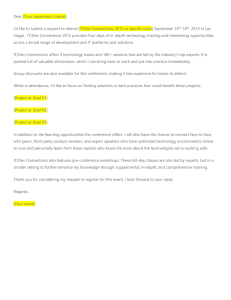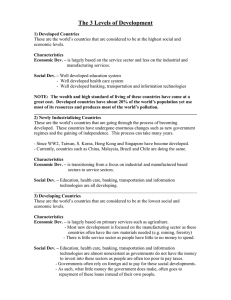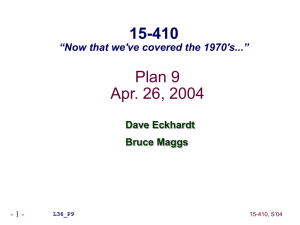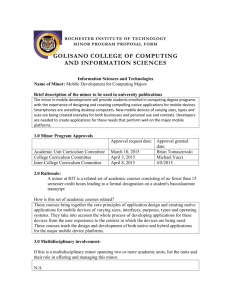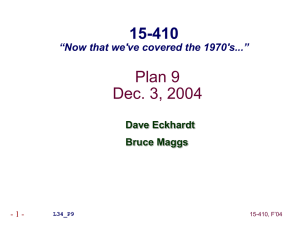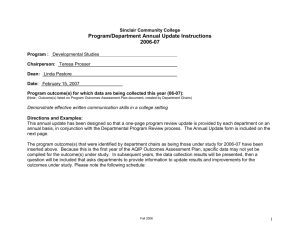Plan 9 Dave Eckhardt 1
advertisement
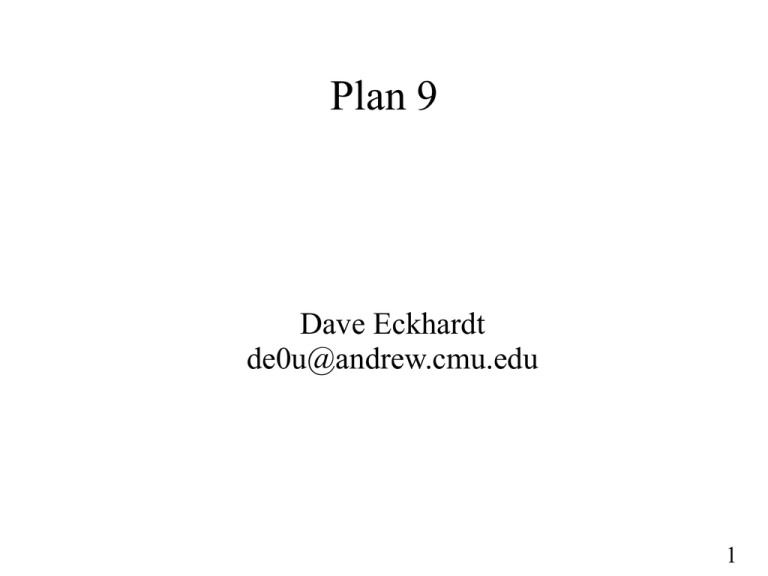
Plan 9 Dave Eckhardt de0u@andrew.cmu.edu 1 Synchronization ● Survey – How many have installed *nix on a box? ● – How many have done an upgrade? – How many have a personally owned box with multiple users? ● – ● Windows? Done an upgrade? What does “PC” stand for? Today: Plan 9 from Bell Labs 1 Synchronization ● Friday – “Review session” – Your chance to “review” me 1 Overview ● What style of computing? – The death of timesharing – The “Unix workstation problem” ● Design principles ● Runtime environment ● File servers (TCP file system) ● Name spaces 1 Timesharing ● One computer per ... – City: Multics – Campus: IBM mainframe – Department: minicomputer ● Sharing, protection easy inside “the community” ● Administration amortized across user base – Printers, too... 1 The Personal Computing Revolution ● Consequence of the microprocessor ● Get your own machine! ● No more “disk quota” ● You decide which software is on the box – ● Upgrade whenever you want Great! 1 The Rallying Cry ● One of the Alto's most attractive features is that it does not run faster at night. – Butler Lampson? 1 The Personal Computing Disaster ● You do your own backups – ● You do emergency security upgrades – ● Day or night! Sharing files is hard, risky – ● Probably not! machine:/usr/... (until it retires) Every machine you use has different software 1 Hybrid Approach ● Centralize “the right” resources – Backed-up, easily-shared file systems – Complex (licensed) software packages – Version management / bug patches ● Access those resources from a fast local machine ● Which OS on the servers? – ● Don't care – black boxes Which OS on the workstation? 1 Workstation Operating Systems ● Unix? – Good: It's the system you're used to using – Bad: Administer it yourself ● ● /etc/passwd, /etc/group, anti-relay your sendmail... Windows – Your very own copy of VMS! – Support for organization-wide user directory – Firm central control over machine ● “install software” is a privilege 1 Workstation Operating Systems ● Mac OS 9 – ● Mac OS X – ● Your own ... whatever it was Your own Unix system! (see above) VM/CMS or MVS!!! – IBM PC XT/370 – Your own mainframe! ● You and your whole family can (must) administer it 1 The “Network Computer” ● Your own display, keyboard, mouse ● Log in to a real computer for your real computing ● Every keystroke, every mouse click over the net – ● Every font glyph... Also known as – Thin client, X terminal, Windows Terminal Services ● Once “The Next Big Thing” ● Thud 1 The Core Issues ● Who defines and administers resources? ● What goes across the network? ● – X terminal: keystrokes, bitmaps – AFS: files Are legacy OSs right for this job? 1 The Plan 9 Approach ● “Build a UNIX out of little systems” – ● Compatibility of essence – ● ● ...not “a system out of little Unices” Not real portability Take the good things – Tree-structured file system – “Everything is a file” Toss the rest (ttys, signals!!!) 1 Design principles ● Everything is a file – ● “Remote access” is the common case – ● Standard resource access protocol, 9P Personal namespaces – ● Standard naming system for all resources Naming conventions keep it sane A practical issue: Open Source – Unix source not available at the birthplace! 1 System Architecture ● Shared-memory multiprocessor cycle servers ● Reliable machine-room file servers – ● Plan 9's eternal versioned file system Remote-access workstation terminals – Access your view of the environment – Don't contain your environment 1 1 Custom Namespaces ● /bin/date means your architecture's binary ● /dev/cons means your terminal ● Per-window devices ● /mail/fs/mbox/25 is the 25th message in your box 1 The /bin File System ● Look, Ma, no $PATH! % bind /sparc/bin /bin % bind -a /rc/bin /bin % bind -a /usr/davide/sparc/bin /bin ● /bin is a union directory – Each backing directory searched in order 1 /dev/tty vs. /dev/cons % (process_foo <foo >bar ) >&errs ● What if process_foo wants to talk to the user? ● Unix – magic device “/dev/tty” – ● When you open it, you actually open /dev/ttyXX Plan 9 – correct namespace contains /dev/cons – The right device is mounted as /dev/cons – By whoever runs you (window manager, login, ...) 1 Per-Window Devices ● ● X: a complex monolithic server somewhere – House of a thousand mysteries – Not on the 15-410 reading list: ICCCM Plan 9: Per-window devices – /dev/screen, /dev/mouse, /dev/cons – /dev/label - window title – /dev/wdir – working directory % echo top > /dev/wctl 1 The Serial-Port File System ● Look, Ma, no ioctl()! % bind -a '#t' /dev % echo b9600 > /dev/eia1ctl % echo “foo” > /dev/eia1 1 The TCP File System ● Look, Ma, no finger command! % cat /net/tcp/clone/ctl 44 % cd /net/tcp/44 % echo “connect 128.2.194.80!79” > ctl % echo davide > data % cat data ● Look, Ma, no NAT proxy setup! % import gateway.srv /net/tcp 1 The /tmp Problem ● Unix /tmp: security hole generator ● Programs write /tmp/program.3802398 – ● Or /tmp/program.$USER.3432432 No name collision “in practice” – Unless an adversary is doing the practicing – ln -s /tmp/program.3802398 /.cshrc – Suggest a command line to a setuid root program... 1 Fixing /tmp ● No inter-user security problem if only one user! ● Plan 9 /tmp is per-user ● Matches (sloppy) programmer mental model 1 Plan 9 3-Level File Store ● Exports one tree spanning many disks – ● 3-level store – ● Users bind parts of the tree into namespaces RAM caches disks, disks cache WORM jukebox Daily snapshots, available forever – /n/dump/1995/0315 is 1995-03-15 snapshot – Time travel without “restoring from tape” – Public files are eternally public – be careful! 1 Plan 9 Process Model ● New-process model – fork()/mount()/exec() ● System calls block ● Task/thread continuum via rfork() – Resources are shared/copied/new ● ● – Name space, environment strings File descriptor table, memory segments, notes rfork() w/o “new process” bit edits current process 1 Process Synchronization ● ● rendezvous(tag, value) – Sleeps until a 2nd process presents matching tag – Two processes swap values – “Tag space” sharing via rfork() like other resources Shared-memory spin-locks 1 Summary ● Files, files, files – “Plumber” paper ● ● ● ● – Isn't it cleaner than ● ● Programmable file server Parses strings, extracts filenames Sends filenames to programs File, file, blah, blah, ho hum? Signals, sockets, RPC program numbers, CORBA? Not just another reimplementation of 1970 1 More Information ● http://www.cs.bell-labs.com/plan9dist/ 1 Disclaimer ● A distributed system is a system in which I can't do my work because some computer has failed that I've never even heard of. – Leslie Lamport 1
